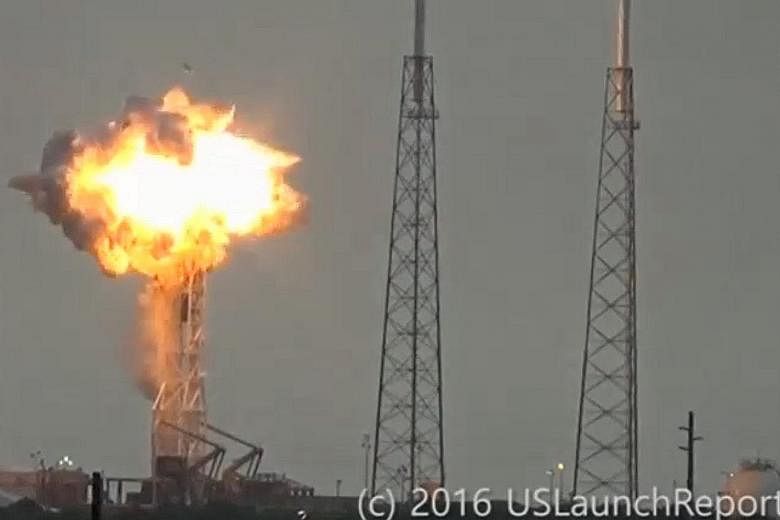JERUSALEM • The launchpad destruction of an advanced Israeli communications satellite may have dealt a blow to the country's aerospace industry, the Israel Space Agency (ISA) said yesterday.
An unmanned SpaceX Falcon 9 rocket exploded during a test in Florida on Thursday, destroying the Israeli-built and owned Amos-6 satellite that Facebook planned to use to beam high-speed Internet to sub-Saharan Africa.
Dramatic footage broadcast by ABC News showed the rocket burst into a ball of flames amid what appeared to be a succession of blasts - sending its payload tumbling to the ground as a dense plume of black smoke filled the air.
ISA chairman Yitzchak Ben Yisrael said the blast's shock waves could reverberate far beyond Cape Canaveral. He said the incident could jeopardise a pending deal for the sale of private Israeli firm and Amos-operator Spacecom to China's Xinwei group, reportedly worth US$285 million (S$387 million) and conditional on the satellite successfully entering service.
"This is the second blow, ahead of the Chinese deal," he said, recalling the blackout of the Amos-5 satellite, which like Amos-6 was owned and operated by Spacecom. Communication with the Franco-Italian made Amos-5 was lost in November last year, four years after it was launched from Kazakhstan.
"There is a major question about the launch and I very much hope that Spacecom is strong enough to overcome these things and to order a new satellite," Mr Ben Yisrael told Israeli public radio.
"If it orders a new satellite, it will take between two and three years to fill the gap."
Amos-6 manufacturer Israel Aircraft Industries (IAI) said the satellite was "the largest and most advanced communications satellite ever built in Israel".
"Obviously, we are disappointed about this incident in the launch vehicle and are ready and willing to assist Spacecom in any manner," it said. "The communications satellite business is strategic for IAI and the state of Israel."
ISA, which is part of the country's science ministry, said "support for the space industry in Israel will continue with the aim of continuing at the forefront of technology".
It said Science Minister Ofir Akunis would convene industry leaders tomorrow for "an emergency debate and situation report".
Mr David Zusiman, a former project manager for the Amos-3 and 4 satellite projects and who was involved in the early stages of Amos-6, said that the explosion was a setback but not necessarily a disaster.
"Amos-6 can be replaced by an identical satellite which it will be possible to order immediately, thanks to the insurance money they will get," he said in an interview on public radio.
"The insurance is supposed to cover the cost of a complete satellite, including a new launch."
Amos-6 has an estimated value of between US$200 million and US$300 million, according to Dr John Logsdon, former director of the Space Policy Institute at George Washington University.
"The clients who bought the extra capability of Amos-6 could suffer damage because it sets back their programmes by two to three years," he said. "I don't know if the image of the Israeli space industry will be harmed."
AGENCE FRANCE-PRESSE

